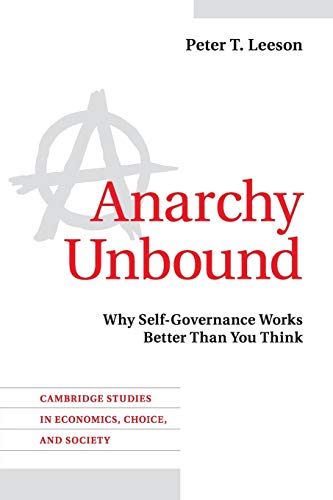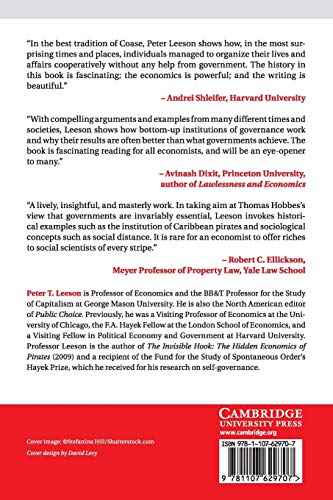Servicios al cliente
Sobre nosotros
Copyright © 2025 Desertcart Holdings Limited
Desert Online General Trading LLC
Dubai, United Arab Emirates



Anarchy Unbound: Why Self-Governance Works Better Than You Think (Cambridge Studies in Economics, Choice, and Society)
I**E
Excellent, subtle, and powerful exploration into the sources of social order
Leeson puts together an amazing set of papers studying order in the most unlikely places. It will take decades for the main thesis of this books to really sink in, but when it does, it will radically change the foundational assumptions in the social sciences. Contra Hobbes and nearly every economist and political theorist since, Leeson shows that absent a coercive monopoly (a state), humans can, have, and still do cooperate peacefully and efficiently given the constraints they face. Leeson shows how complex institutions emerge to handle conflicts and bring about order, and how these institutions are often robust, nuanced, firm, flexible, and adaptive to the changing needs of the communities in which they emerge.When it comes to comparative political economy and the much needed application of rational choice theory to historical and sociological studies, Leeson is the best in the business. It will take a little time after you read it for the implications of these simple yet radical discoveries to sink in.
L**N
Free people forming voluntary alliances offer a better measure of beneficial social control over truly destructive behaviors ...
This is gong to be one of the most important books for moving people to an important understanding. That understanding is that people are peaceful, altruistic (with reciprocity seeking) and cooperative. Free people forming voluntary alliances offer a better measure of beneficial social control over truly destructive behaviors than government. Government tends to have motivation contrary to order and that are productive of destructive chaos - chaos with a departmental seal, a coerced-money budget, and an comforting organizational chart.
X**U
Fascinating historical examples of emergent order. Clear and well written.
History (including recent history) is full of unexpected stories of the emergence of private institutions to faciltate cooperation. Leeson tells some of these stories in clear, transparent prose. The pirate chapter alone is worth the price of admission. This is not just history as entertainment; Leeson's insights could profoundly affect development policies.The most surprising thing I learned: some prison gangs have written constitutions.
S**E
Interesting, but not a vital read.
The idea that "anarchy works better than you think" sets a pretty low bar to overcome. Leeson looks to the root of the word anarchy, the Greek 'anarkos' which means "without a ruler". Once this is clarified, he picks examples from many diverse sources to show how societies have functioned "without a ruler". These were not always perfect, but usually better than life with no form of governance at all.I liked the chapters of privateers and the one on pirate constitutions. Those were both interesting. The last section, on Somalia without a government was interesting as well, but Leeson started to beat me over the head with comparing high government - high anarchy and low government - low anarchy and it just got to be too much of a goodish thing. Interesting, but not a vital read.
J**N
Not worth the price
Was thinking this would be a decent read… but $25 for a paperback book that's less than 300 pages? Cmon. Some of us are college students
Trustpilot
Hace 3 semanas
Hace 5 días